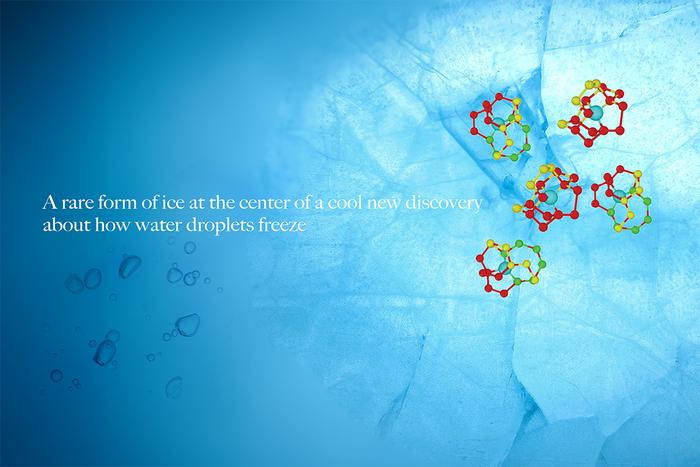Tokyo, Japan – Ice is far more complicated than most of us realize, with over 20 different varieties known to science, forming under various combinations of pressure and temperature. The kind we use to chill our drinks is known as ice I, and it’s one of the few forms of ice that exist naturally on Earth. Researchers from Japan have recently discovered another type of ice: ice 0, an unusual form of ice that can seed the formation of ice crystals in supercooled water.

Credit: Institute of Industrial Science, The University of Tokyo
Tokyo, Japan – Ice is far more complicated than most of us realize, with over 20 different varieties known to science, forming under various combinations of pressure and temperature. The kind we use to chill our drinks is known as ice I, and it’s one of the few forms of ice that exist naturally on Earth. Researchers from Japan have recently discovered another type of ice: ice 0, an unusual form of ice that can seed the formation of ice crystals in supercooled water.
The formation of ice near the surface of liquid water can start from tiny crystal precursors with a structure similar to a rare type of ice, known as ice 0. In a study published this month in Nature Communications, researchers from the Social Cooperation Research Department “Frost Protection Science,” at the Institute of Industrial Science, The University of Tokyo showed that these ice 0-like structures can cause a water droplet to freeze near its surface rather than at its core. This discovery resolves a longstanding puzzle and could help redefine our understanding of how ice forms.
Crystallization of ice, known as ice nucleation, usually happens heterogeneously, or in other words, at a solid surface. This is normally expected to happen at the surface of the water’s container, where liquid meets solid. However, this new research shows that ice crystallization can also occur just below the water’s surface, where it meets the air. Here, the ice nucleates around small precursors with the same characteristic ring-shaped structure as ice 0.
“Simulations have shown that a water droplet is more likely to crystallize near the free surface under isothermal conditions,” says lead author of the study Gang Sun. “This resolves a longstanding debate about whether crystallization occurs more readily on the surface or internally.”
Ice 0 precursors have a structure very similar to supercooled water, allowing water molecules to crystallize more readily from it, without needing to directly form themselves into the structure of regular ice. The tiny ice 0 precursors are formed spontaneously, as a result of negative pressure effects caused by the surface tension of water. Once crystallization begins from these precursors, structures similar to ice 0 quickly rearrange themselves into the more familiar ice I.
Senior author, Hajime Tanaka stresses the wide-ranging implications of this study, noting that, “The findings regarding the mechanism of surface crystallization of water are expected to contribute significantly to various fields, including climate studies and food sciences, where water crystallization plays a critical role.”
A more detailed understanding of ice and how it forms can give invaluable insight into a variety of areas of study. This work may have particular importance in meteorology, for example, where ice formation via ice 0-like precursors may have a much more noticeable effect in small water droplets like those found in clouds. Understanding ice can have benefits in technology too, from food sciences to air conditioning.
###
The article, “Surface-induced water crystallization driven by precursors formed in negative pressure regions” was published in Nature Communications at DOI: 10.1038/s41467-024-50188-1.
About Institute of Industrial Science, The University of Tokyo
The Institute of Industrial Science, The University of Tokyo (UTokyo-IIS) is one of the largest university-attached research institutes in Japan. UTokyo-IIS is comprised of over 120 research laboratories—each headed by a faculty member—and has over 1,200 members (approximately 400 staff and 800 students) actively engaged in education and research. Its activities cover almost all areas of engineering. Since its foundation in 1949, UTokyo-IIS has worked to bridge the huge gaps that exist between academic disciplines and real-world applications.
Journal
Nature Communications
Article Title
Surface-induced water crystallization driven by precursors formed in negative pressure regions
Article Publication Date
26-Jul-2024



